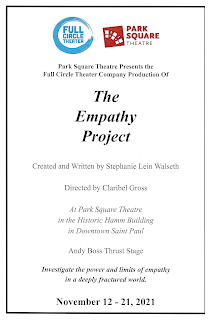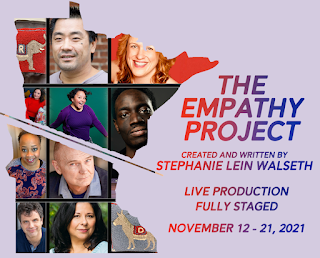The Empathy Project is in the style of "verbatim theater," or "documentary theater," meaning that it's constructed from interviews of real people about their lives (the most well-known of this kind of play is The Laramie Project). Each of the nine actors (Song Kim, Dominique Jones, Shanan Custer, Oogie_Push, Siddeeqah Shabazz, Kim Vasquez, Peter Colburn, Marci Lucht, and Joshua C. Larson) play one or two of the interviewees (names and locations have been changed to protect their identity) through what feels like monologues in conversation. The individual stories are separate and different, doled out in pieces throughout the show, but they're put together in a way that draws parallels between the stories. For most of the show, the whole cast is on stage, listening to each other and empathizing, even if not involved in the story at the moment.
The varied stories of Minnesotans include a man whose parents met in a Japanese internment camp, a self-described "liberal redneck," a Black cop in the suburbs, a Republican who gladly accepts assistance for her special needs child, an interracial couple living in rural Minnesota, and an indigenous woman whose parents and grandparents were forced into boarding schools. In these stories we can find similarities to our own lives and families, even if some of the specifics may differ.Even though the show consists primarily of dialogue rather than plot or action, the cast doesn't just stand there and speak. Director Claribel Gross makes full use of the space in Park Square's basement thrust stage, as the cast moves around in neat formations or orderly chaos. They occasionally perform dancelike movement, sometimes literally leaning into each other, that heightens the emotions of the stories (devised by the cast during the rehearsal process). This piece was effective just with people speaking from individual zoom boxes, but it has become so much more as the stories intersect and interact in the same space.
The clean and simple set features the familiar shape of our state, cut into a few pieces, with a couple different levels and boxes to sit on that add interest to the empty space. The cast is dressed in basic clothing that doesn't distract from the storytelling and allows them to transform into different characters. (Scenic design by Mina Kinukawa, costume design by Khamphian Vang.)
The Empathy Project is a great example of the kind of theater coming out of the challenging events of the last few years - a global pandemic, the murder of George Floyd, divisive elections. Theater like this helps us make sense of what we've been going through, what we've been feeling, and does exactly what the title says - engender empathy with people whose lives and experiences may be different from our own. Only three more performances remain in this short run; click here for more info and to purchase tickets.


